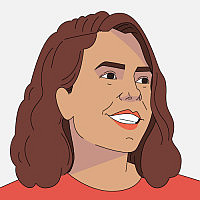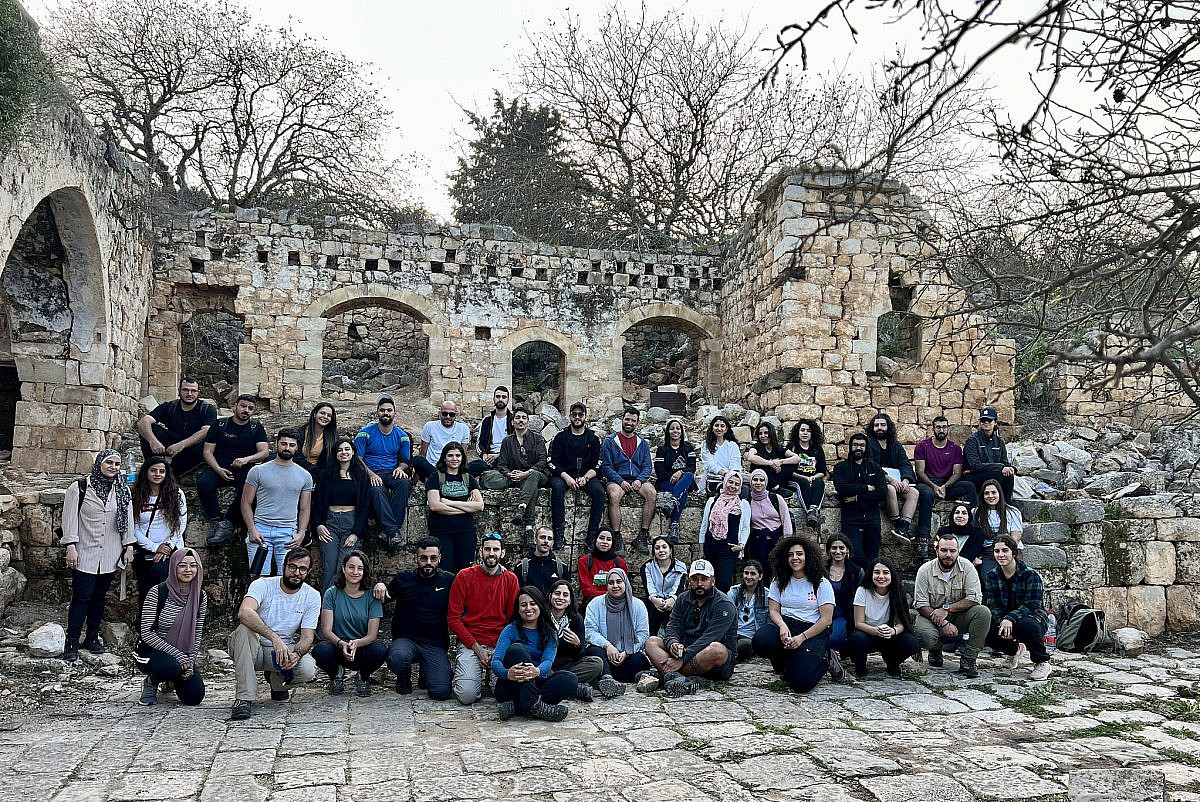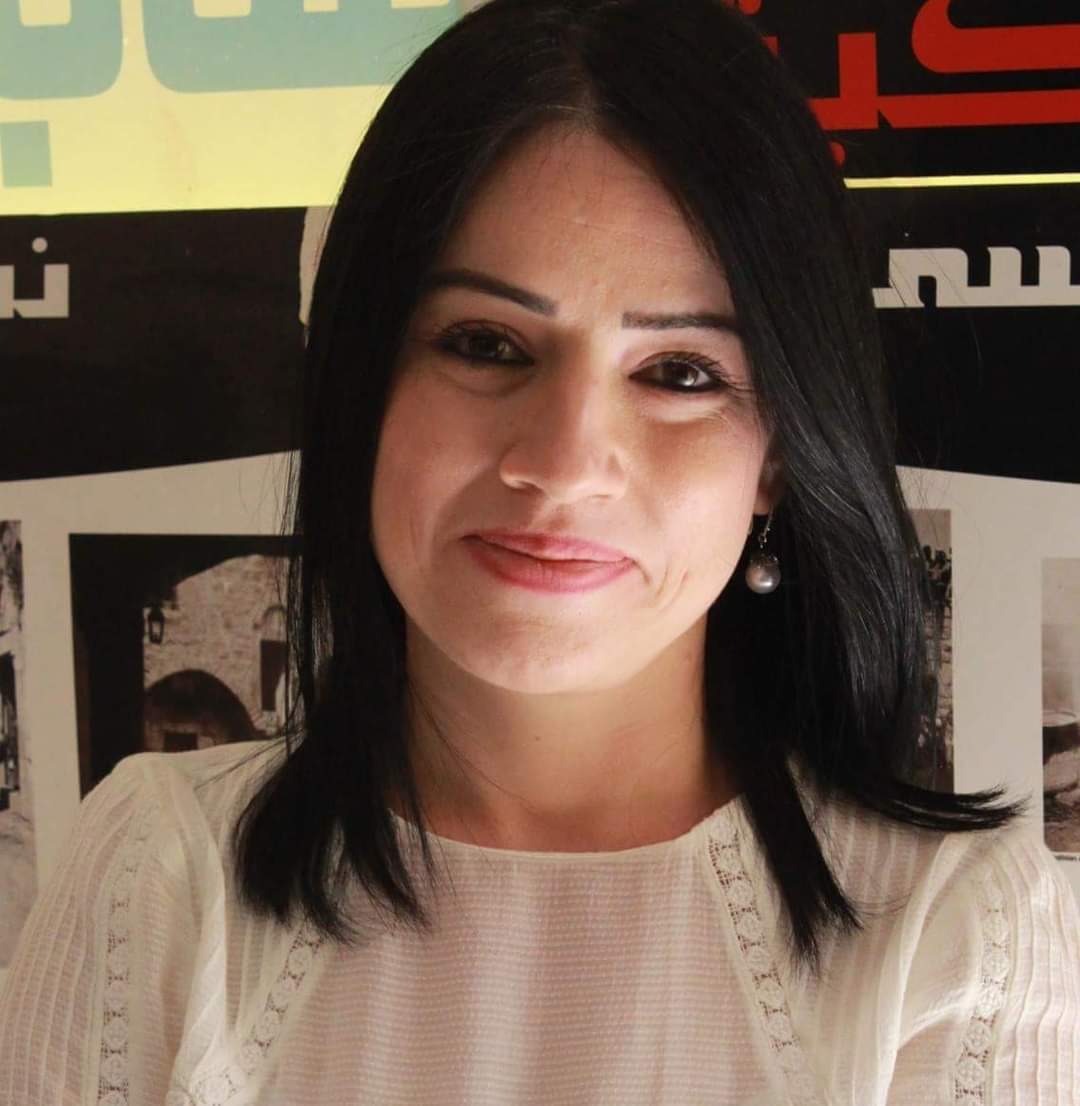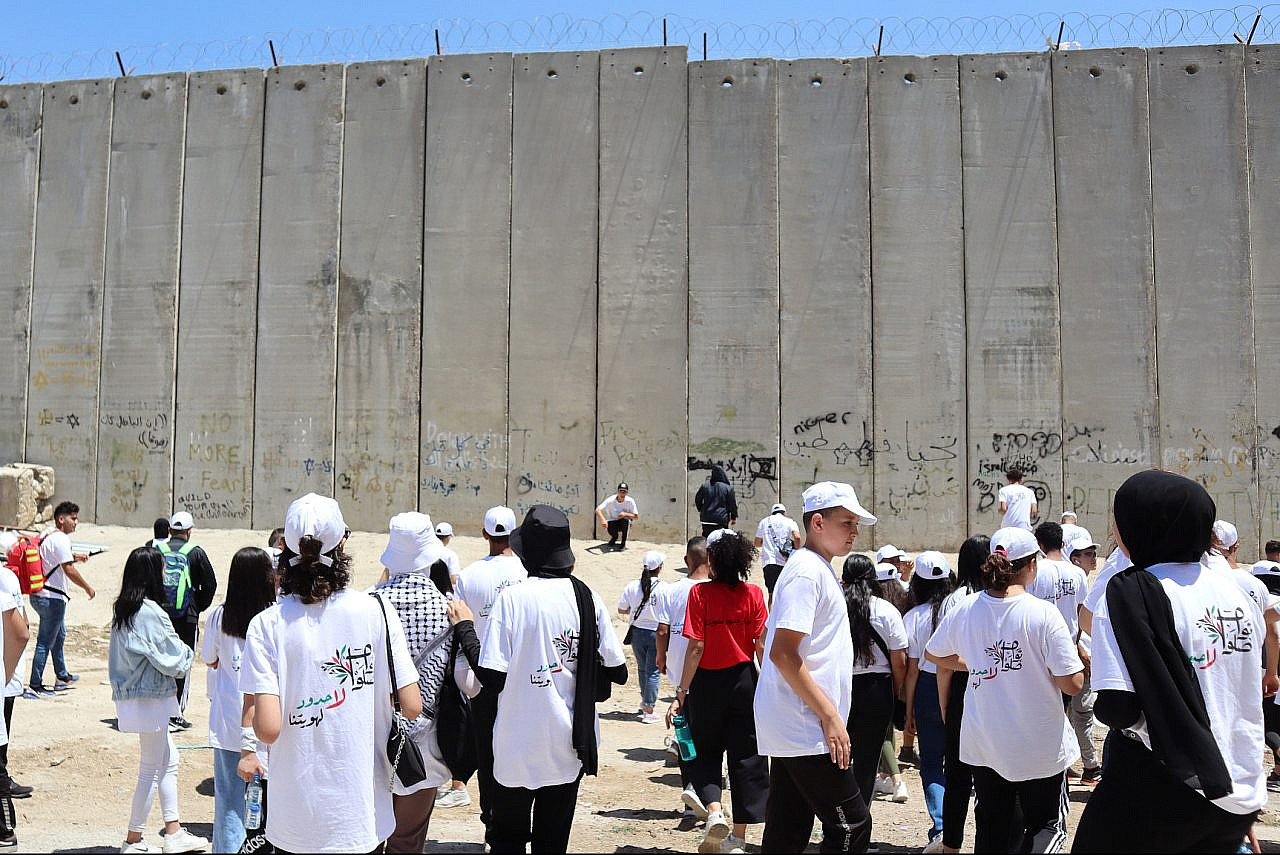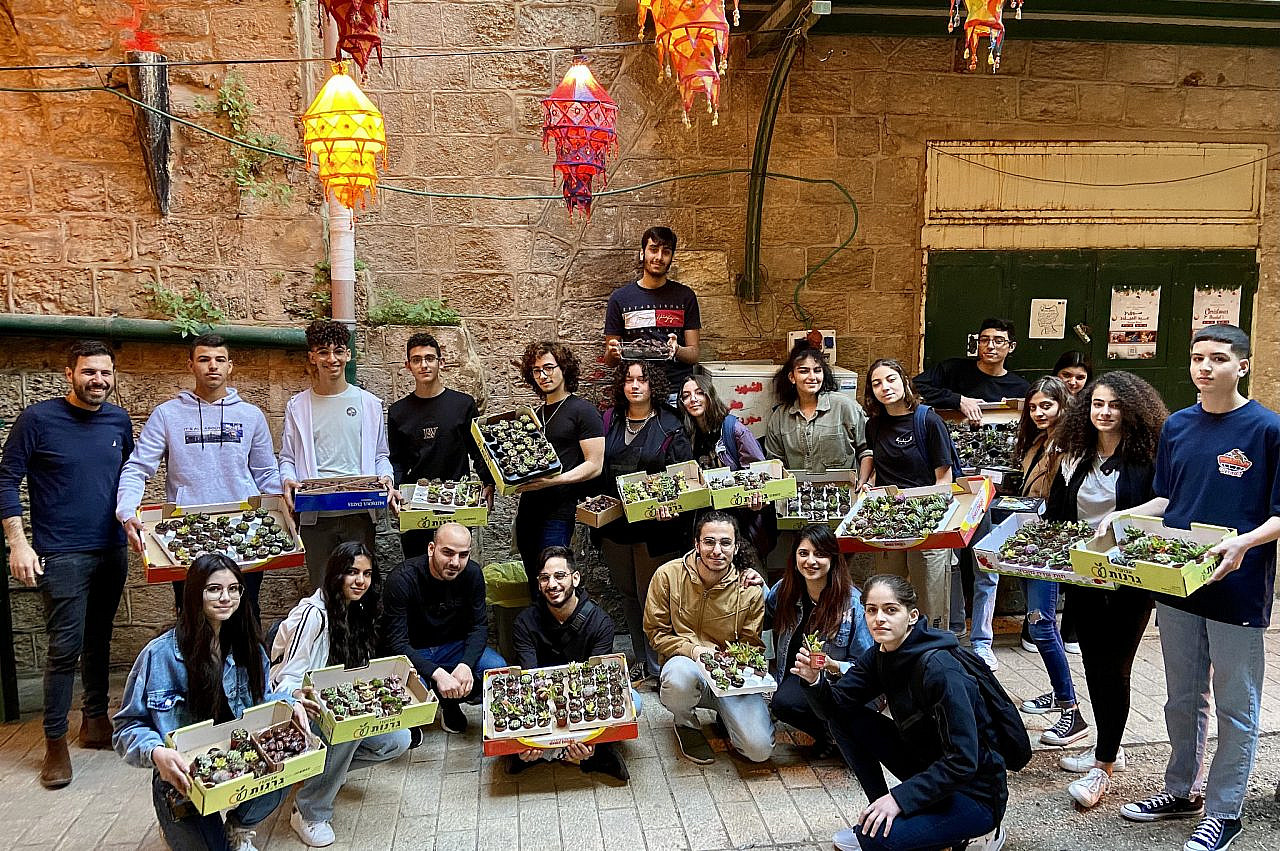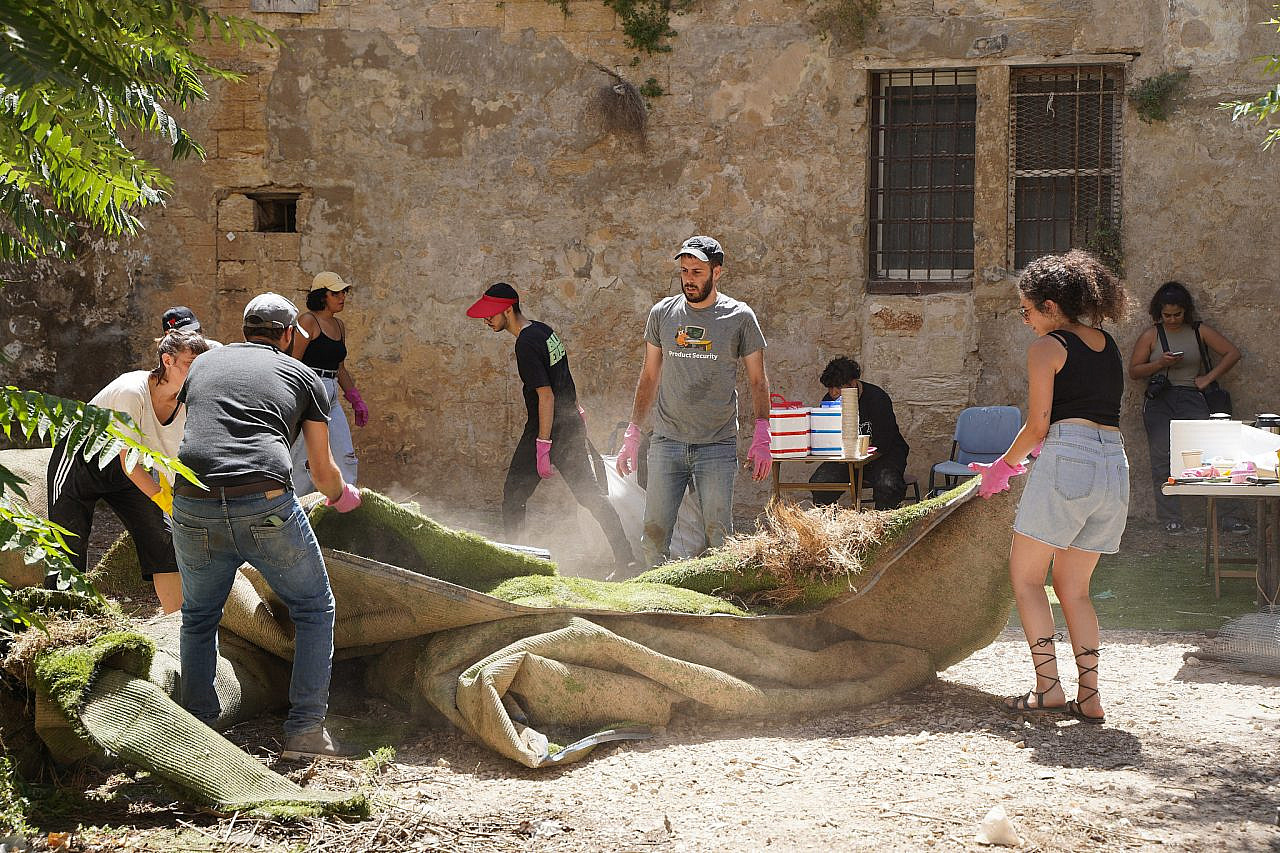In May 2021, during the “Unity” or “Dignity” Intifada, I went to a protest in Haifa with a group of friends. When we arrived, we saw dozens of protesters standing on the sidewalk, chanting Palestinian slogans and songs, raising a variety of signs. Israeli police stood on the other side of the street, heavily armed and wearing protective gear. My heart wanted to explode with hope and enthusiasm that, despite all of Israel’s attempts to silence and eliminate us, here we were standing fearless in our togetherness.
Among the protesters was Nidaa Nassar, a passionate Palestinian powerhouse who heads the Haifa-based Baladna Association for Arab Youth, and whom I had met just a few months earlier. Nassar suggested I lock arms with her and another friend. I thought she was being overprotective, and told her there was no need to worry. “I’ve covered plenty of protests in the West Bank,” I told her. But Nassar replied that she had a feeling the police’s crackdown would be brutal.
We started marching and chanting on the sidewalk, not even blocking the street. Within less than a minute, the police charged from behind us and rode their huge horses into the crowd. The horses shoved people into nearby restaurants; one officer rode their horse into a restaurant as people screamed and pushed the chairs and tables. I was carried by the sea of scrambling protesters, separated from the arm lock with Nassar, and shoved against the wall of the restaurant, the air knocked out of my lungs. As I tried to regain my breath, I felt lost and scared.
Nassar came to the rescue. She had made sure to find me against all odds. Amid the chaos, she explained what we could do to avoid the violence while staying at the scene to witness and help other protesters. I was taken by her persistence and energy.
Fast forward nearly two years, to Ramadan in April 2023. Israeli forces had attacked worshipers inside Al-Aqsa Mosque during the Muslim practice of spiritual retreat called I’tikaf. Movements in Haifa called for a protest, including Nassar’s organization Baladna. There were dozens of protesters, much fewer than in May 2021. Speaking with me and others, Nassar was well aware of the despair around us, but insisted on staying hopeful — perhaps a byproduct of her work with young people. It was after that protest that I understood Nassar more: why she heads Baladna, why she’s a fierce advocate for young people, and why she tirelessly dedicates herself to the Palestinian cause.
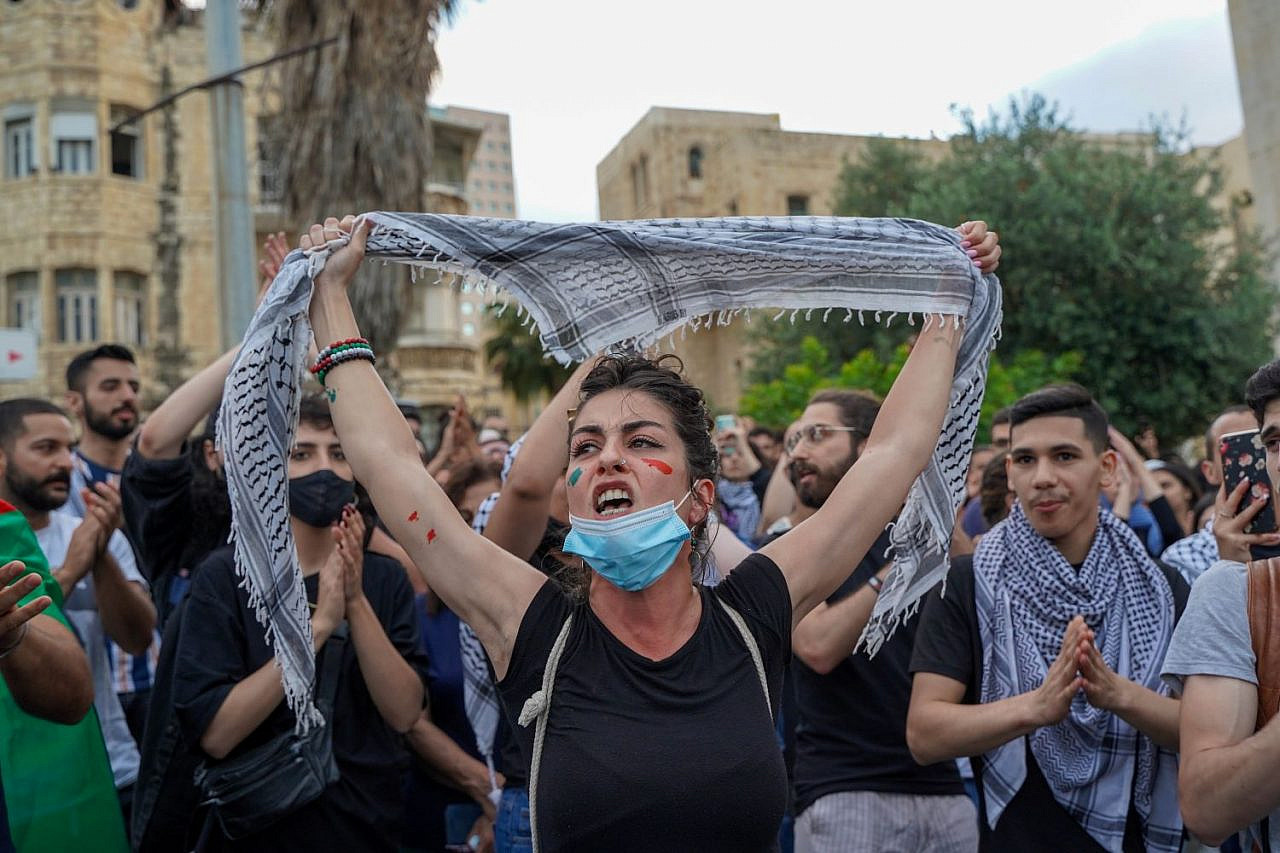
“It was important for us to take part in organizing the protest, because Baladna sees itself as part of a young, political, and public movement,” Nassar told me when we sat down for an interview in April. “We diligently strive to achieve that through education and community work. It is important for us to flow between professional, structured work and the resistance movement on the streets, so we do not lock ourselves in a style of work that is too closed off and lacks any interaction with our political and societal environment.”
Resisting erasure
Nassar, who studied social work and then conflict studies at the Hebrew University of Jerusalem, was an active member of the student movement of Balad (Tajammu’), a Palestinian national political party in Israel that advocates for “a state of all its citizens.” She later became involved in the party’s wider youth branch and its central committee, as well as its main political office. “It was an important phase for me,” she said. “I was part of a growing young power that was enthusiastic to change the [community’s] work.”
After working with Baladna in various capacities, Nassar took over as the organization’s director in 2018. According to her, Baladna’s purpose is to educate young Palestinians to hold onto their national identity, “which Israel tries to erase along with our belonging to the Palestinian people, and our self-knowledge.” This erasure, she explains, “is why it is super important that youth have spaces to discuss that reality and access information that is kept from them in formal education frames, to show how their identity and history are part of their everyday life and struggles.” Baladna especially encourages young people to translate this awareness through grassroots organizing and collective action.
“We do not encourage an elitist style of volunteering, where groups are separated from the public mood and its programs are inflexible. We encourage being part of the natural patterns that occur organically within society,” Nassar said.
“Joining a national protest is a natural extension of our role as Baladna,” she continued. “It is clear to us from the general political scene that the popular movement on the ground is irreplaceable. It is hard to hope for any change without that important and substantial ring of being on the streets. Because, clearly, annoying Israel by being on the streets makes a difference. But we do not take to the streets to annoy — we do so to practice collective strength.” Nassar raises the examples of Baladna’s youth clubs in Nazareth and in the Naqab (Negev), both of which provide rare spaces for Palestinian youth to volunteer and engage with their communities.
In both locations, Nassar notes, “we are continuously a part of local organizing to hold protests and initiatives. One of our main goals is to enable that human power, to pump in more youthful energy, and to create more spaces for awareness and education. Eventually, we hope for such spaces to exert popular movement on the ground, with the people, in the streets, instead of staying confined to designated spaces in organizational work. This is not a given, and it was not always the case, but we are about to do it more now.”
The organization’s various projects reflect this holistic effort. One of the “Youth Spaces” programs that Baladna runs is called Hirak (“movement”), which encourages high school students to undertake an active volunteering role in their towns and villages. Baladna establishes 10 local groups annually and each group plans and implements a local volunteering initiative related to the challenges of life where they live. It aims to respond to the aspirations and needs of the youth and enhance their sense of belonging and social engagement.
Other projects include Hawiya (“identity”), which involves hiking activities that seek to deepen the relationship between Palestinian youth and their natural surroundings; Tawasalou’ (“get in touch”), which provides common spaces for Palestinian youth fragmented between the West Bank, Israel, and Jerusalem to develop common positions on political and social issues; and Sumud (“steadfastness”), which coordinates joint actions between Palestinian youth in Israel and the Youth of Sumud group active in areas threatened by demolitions and displacement in Masafer Yatta in the South Hebron Hills. This is in addition to activities encouraging youth to develop national campaigns addressing urgent issues, and enabling connections with youth activists around the world.
From awareness to action
What is your goal in heading Baladna?
“Baladna works with young Palestinians in three aspects. The first is awareness: liberational, democratic, and feminist awareness that rejects hierarchical power relations in all its forms. That is where the awareness of the Palestinian struggle comes in, and what it means to be Palestinian citizens in this country.
“The second aspect is to encourage the youth to translate that awareness into action, organization, and volunteering on all levels possible — such as young Palestinians in Tamra [an Arab village in the north] who did not have a public library, so they created a space to study. And the third aspect is to work directly on internal issues concerning young people, such as the rise of violence and crime in our society.
“My role within Baladna is a natural extension of the work I did my whole life. From 2010 to 2017, during my involvement with Baladna, many popular youth movements emerged, even ahead of the 2013 protests against the Prawer Plan, which if implemented would have resulted in the forced displacement of tens of thousands of Bedouin in the Naqab desert. ُEven after the revolutions of the Arab Spring, we started organizing national protests around causes connected to land and prisoners.”
What do you think contributed to the rise of the popular movement during that period [against the Prawer Plan]?
“We wanted to make an impact, and we thought highly of the Arab popular movement on the ground [in the region]. The idea of shutting down a street went beyond the frameworks of the other [Palestinian] movements and parties; it started before Prawer and continued during the Arab Spring, which enhanced the popular youth scene even more.
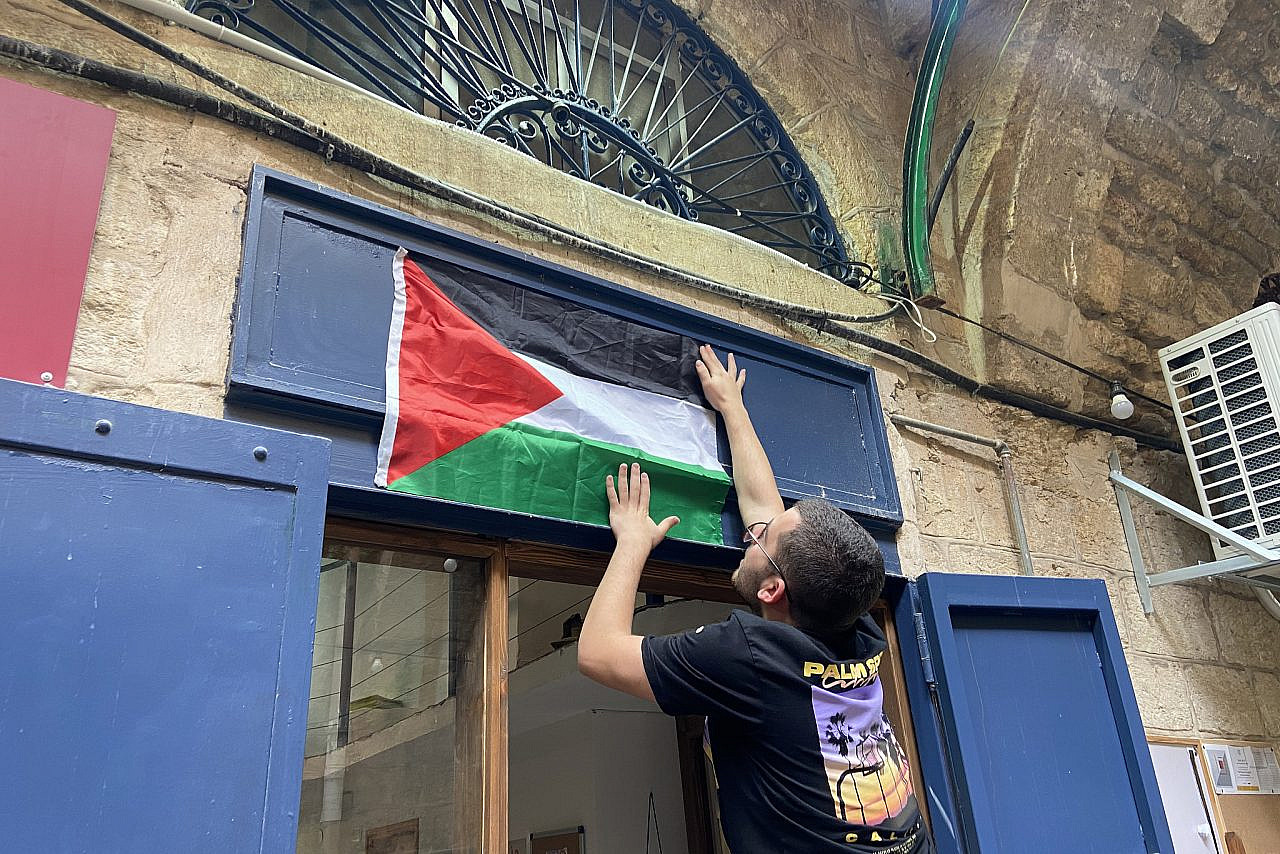
“The opposition to the Prawer Plan was an important phase and a peak experience [for Palestinian youth]: we learned a lot on an organizational and political level, and it became a model for future events. I acquired tools during that time, and we all felt that our work on the ground was worthwhile.”
Which is your favorite of Baladna’s projects?
“I cannot pick a favorite but what I’m sure of is that there is a bundle of things I cannot separate. We must work directly on political, democratic and feminist awareness and we must have a framework for youth volunteering. The combination of all those things together makes the scene and I cannot imagine one thing on its own out of the bundle. There’s an organic integration between all the projects we do.”
What do you see as some of the biggest issues and concerns for Palestinian youth today?
“The concerns of Palestinian youth are similar to those of youth around the world: how to make an income, what to study, and what career to choose. In studies that looked at what concerns Palestinian citizens of Israel in general, the two main issues were land and housing, and violence and crime.”
Can you say more about Baladna’s work regarding gun crime and violence in Arab communities?
“In a study that Baladna conducted in 2022, pressing matters like crime and violence — in which youth are disproportionately involved as both perpetrators and victims — show that we as a society have lost our inviolability as human beings. It is obvious to us that Israel is the system that is directly responsible and activates crime and violence [in our community], but we also need to understand it on a societal level.
“On the one hand, what is happening inside our society that drives youth to crime and violence? On the other hand, how do we take societal responsibility without ignoring the occupation’s role? Baladna presented practical proposals to limit the spread of violence in the form of projects for young people, in cooperation with authorities such as municipalities, schools, and civil associations, in an attempt to block the path that might lead youth to violence and crime.”
What challenges do you face in this work, and as a Palestinian woman in particular?
“As a woman, I do not face classic sexism, but rather a kind of sexism and violence that is unspoken. It is exclusionary, as if society divided roles for everything in life and put everyone into boxes, a box for men and a box for women. And inside the women’s box, there are different hypotheses about independent women who are active in the political and social fields, like stripping them of their private lives or portraying them as being resilient.
“When it comes to the work of organizations, there are trillions of challenges. Israeli authorities incite against and attack us on a daily basis for using direct political content; we recently had an activity in the Naqab, and the Shabak [Shin Bet] called the center where we were renting a hall and canceled the activity. We also rely on international funds that comply with our rationale, so [the authorities] say our income is a political fund.
“Funding is also unstable and we always worry about making ends meet, and we cannot always do the strategic work that we would like to do or plan ahead. Donors have changing priorities based on political developments around the world, like the COVID-19 pandemic and the war in Ukraine. Also, donors usually condition their funds to be framed under the banner of ‘Israeli democracy,’ which we do not abide by because we do not play this game of beautifying Israel’s reality.
“But the biggest challenge is within our own society: how to encourage people, youth, and foundations to participate in our kind of work, to not be afraid, and to not be indifferent. To work with such organizations means you have to give up many privileges. Our salaries aren’t high, and there is always uncertainty and obstructions. There’s a sense of responsibility and weight because it is social and national work. Still, the privileges of this job are to fulfill yourself, your project, and your identity. I would never choose another kind of work.
“These challenges do not come to me because I’m a woman; it is more because I’m in a framework that operates under Israeli and international political conditions that are limiting, and which requires patience and recharging very often.”
How do you recharge?
“In two ways – one general and one personal. First, I think we [Baladna] are lucky that we work with youth because I see them in their full vigor, energy, and freshness of perspective. For example, it’s my twelfth year of doing our Hirak project [for high schoolers], but when I see the enthusiasm of new youth joining it for the first time, it makes me feel its value, how important that space is for them, how it adds to their consciousness and makes them proud.
“I see the activities of Baladna’s Naqab group, and despite the hardships and energy it took us to start a group there, I know that this is the only space of its kind there. When I see the Baladna club in Nazareth and how they communicate, something about that generation makes me feel a love toward them that makes me stronger.
Most read on +972
“I also feel a sense of responsibility and that I cannot give up, especially after the last few years, when youth movements have become rare. The more we advance, the more the spaces get tighter [because of pushback and pressure], and the more Israelized and individualistic we become. I see at the macro and micro levels how it is essential to keep doing what I’m doing.
“This is not sustainable on its own. At some point, all of us in this field are exposed to burnout, and on an individual level, you learn to find what makes you happy. For me, sports and cooking are therapeutic and rejuvenating.”

